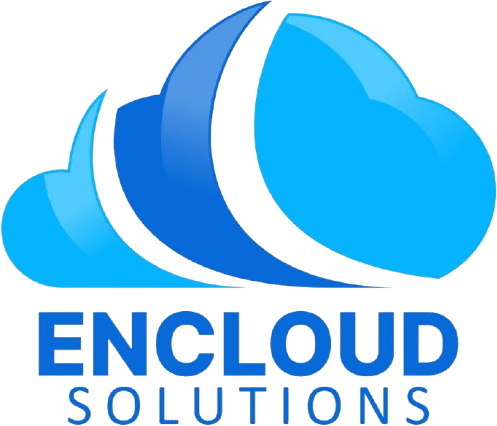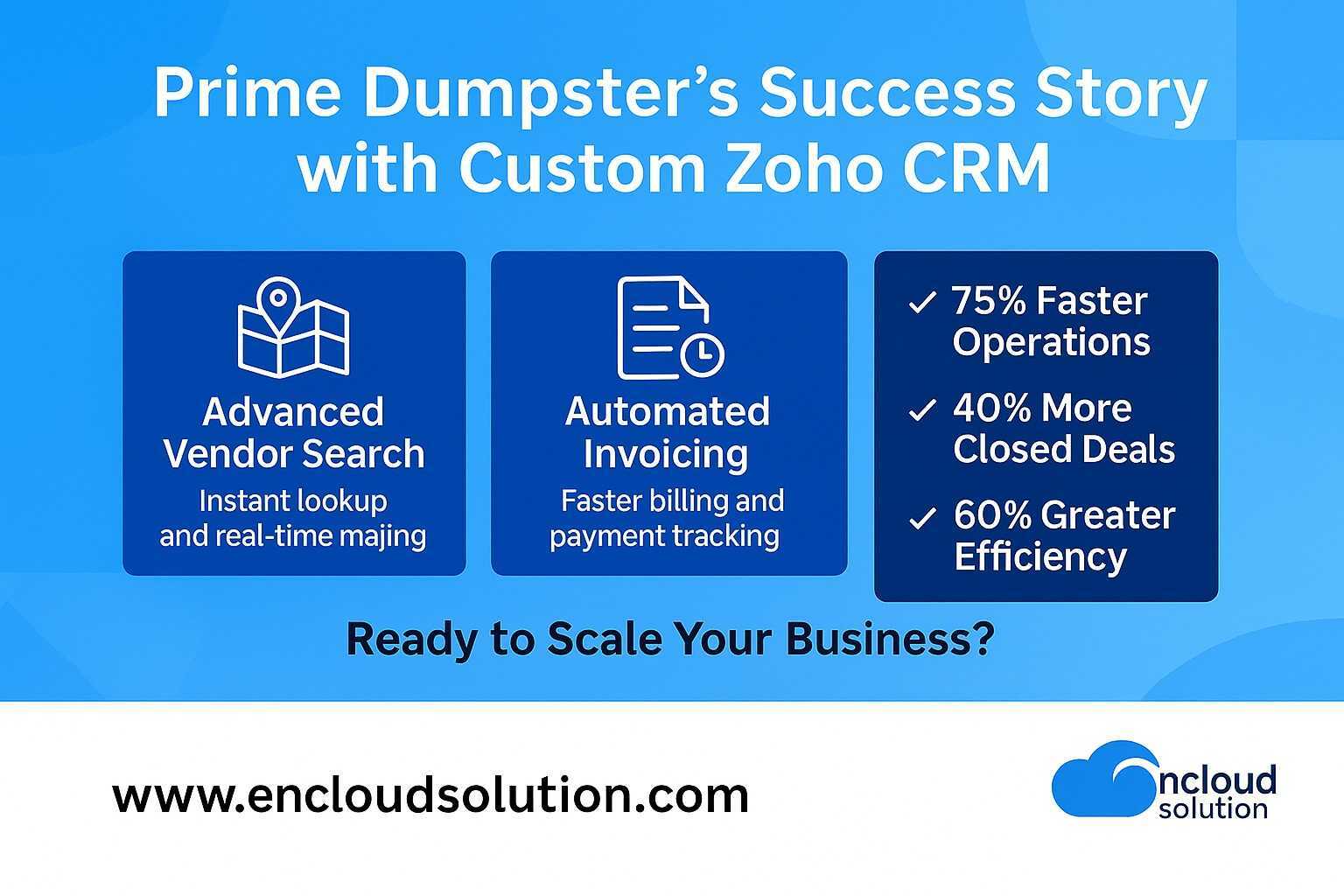Solar companies from solo installers to large enterprises deal with complex sales cycles, lengthy proposals, and on-site project coordination. Managing all this with spreadsheets and disjointed tools leads to inefficiency. Analysts note that installers often struggle with “complex proposal creation, bad project management, [and] poor lead management,” which slows growth. A dedicated solar CRM centralizes customer data, automates workflows, and ensures no lead falls through the cracks.
Key Features of a Solar CRM
The right CRM for solar business offers these essentials:
- Lead and Pipeline Management: Capture and prioritize leads from websites, referrals or campaigns. Track prospects through every stage of the sales funnel. With a solar pipeline CRM, companies can better visualize and close deals faster.
- Automated Proposals and Quotes: Generate accurate solar CRM software quotes and financing proposals quickly. Integrations with design or pricing tools ensure system specs and ROI calculations populate automatically.
- Project Scheduling and Field Service: Once a deal is won, automatically create an installation project. Use shared calendars or Gantt views to schedule site surveys and tasks. Field crews can update jobs on mobile, recording time, parts used, and progress on site.
- Customer Follow-up and Support: Automate follow-up emails, warranty reminders, and service tickets after installation. Keeping customers informed builds trust and boosts referrals with a strong solar company CRM in place.
- Reporting and Analytics: Dashboards show KPIs like lead conversion rates and average deal size. Custom reports reveal bottlenecks in the sales process and opportunities for improvement.
Integrating these features yields big benefits. As Nutshell observes, a solar industry CRM provides “streamlined lead management,” automated tasks, data-driven insights, and enhanced collaboration. In practice, this means less manual work and more consistent sales.
Also Read: Odoo Business Solutions
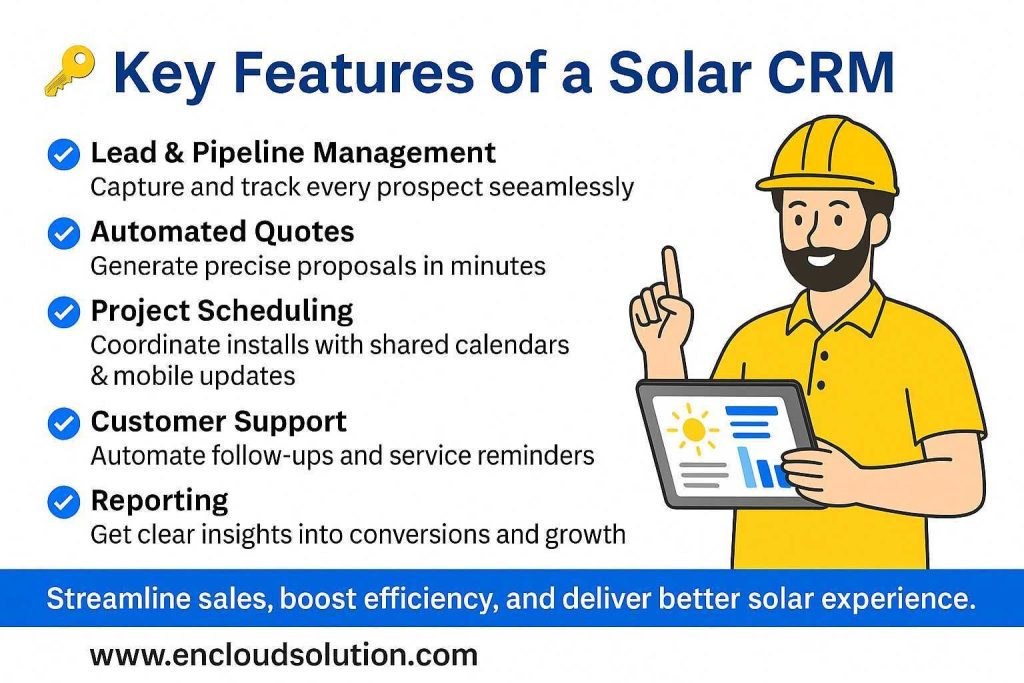
Solar CRM Options: Specialized vs. Integrated
Several CRM products target the solar industry. Niche tools like SPOTIO or Shape CRM have templates for solar canvassing and lead routing. For example, SPOTIO touts itself as “the #1 best CRM for solar sales and Sales Software” for field sales teams. These specialize in mapping, territory management, and multi-channel outreach.
General-purpose CRMs like Salesforce or HubSpot can be customized for solar, but often require extra setup for industry-specific workflows. In contrast, Odoo is a full business suite where CRM is just one module. It integrates sales, inventory, projects, accounting, and more in one platform. It is literally designed as “a suite of open source business apps that cover all your company needs: CRM, eCommerce, accounting, inventory, point of sale, project management, etc.”. This unified approach helps solar companies manage all operations without data gaps with an all in one solar CRM.
Why Odoo Stands Out
Odoo combines CRM with project management and back-office tools. According to experts, it “reduces every aspect of a business into a single, integrated platform” and offers solar firms tools to simplify operations and cut costs. On Odoo’s solar industry page, it highlights a “centralized pipeline” for leads and “all-in-one project management” with automated project creation after a sale. In practice, this means when you close a deal, Odoo automatically generates the installation project and task list.
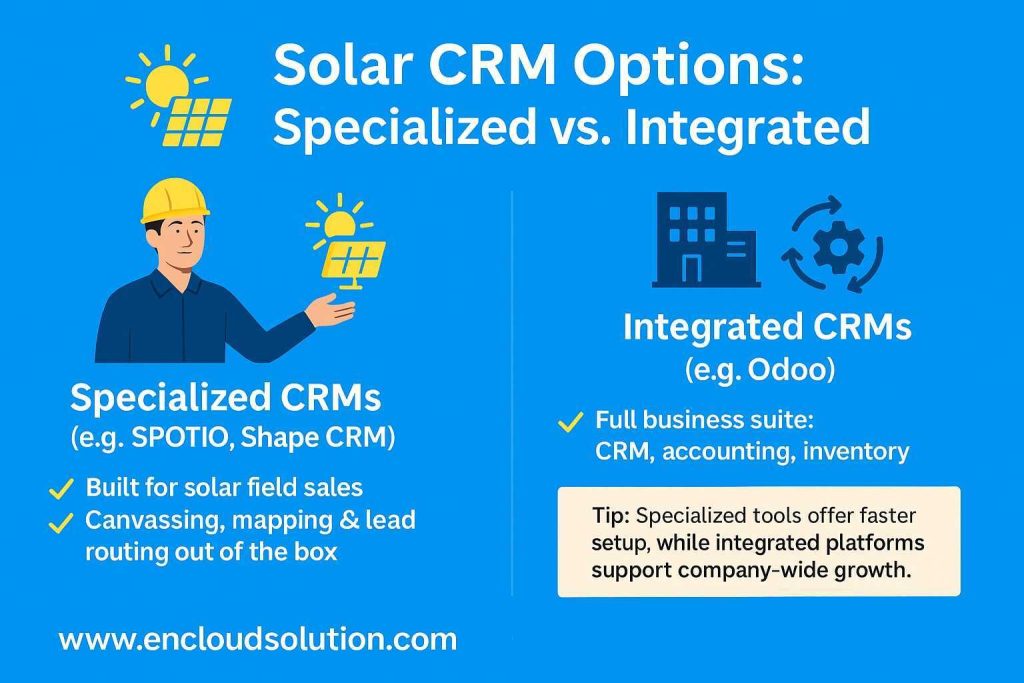
Beyond sales, Odoo covers the entire solar lifecycle. It includes an Inventory module for tracking panels, inverters, and batteries in real time. You can set reordering rules to prevent stockouts and manage multiple warehouses. The Accounting app ties everything together: invoices are linked to sales orders and projects, and financial dashboards keep tabs on cash flow. For example, spare parts used in the field can be invoiced on the spot via the mobile app, and the system immediately updates the financials.
Odoo is also modular and scalable. You can start with core apps (CRM, Projects) and add advanced features (Field Service, IoT integration, etc.) as needed. This keeps initial costs lower. In fact, by centralizing workflows, Odoo “eliminates the need for multiple software systems,” reducing licensing and support costs. As your solar firm grows, Odoo grows with it: its modular structure lets you add new branches, users, or applications without ripping out the system. For companies evaluating options, learning how to choose solar CRM is critical, and Odoo often emerges as the best CRM for solar company due to its scalability.
Also Read: What Is Property Management Software
Odoo’s Solar-Focused Capabilities
Odoo’s suite hits all the right notes for solar businesses:
- CRM & Lead Tracking: Every lead is logged and scored in Odoo. Representatives follow up on calls or emails directly through the system. Detailed records mean sales teams never lose track of a prospect, even if someone leaves the company. This makes Odoo a reliable custom solar CRM solution.
- Project Management: Treat each installation as a project. Managers create tasks (survey, permits, install) with deadlines and assign them to team members. Gantt and Kanban views keep schedules transparent so projects finish on time.
- Field Service App: Technicians receive jobs on mobile. They update job status, log hours, and note spare parts used. Managers see real-time progress. This mobile capability greatly boosts field productivity and positions Odoo among the best solar sales CRM platforms.
- Inventory & Supply Chain: Odoo tracks hardware and parts by serial or batch. Barcode scanning and automated reorders prevent missing components. By consolidating inventory with sales, companies avoid expensive overstocking or shortages.
- Invoicing & Reporting: Generate invoices directly from projects or sales orders. Odoo auto-populates customer info and terms, speeding up billing. Its reporting tools turn project data into dashboards, so businesses can analyze performance and forecast growth in real time.
Together, these capabilities “break down silos” between departments. Sales, installation crews, and finance all work from the same data. For example, if a customer calls about their system, the team can instantly see contract details, past service appointments, and billing history in Odoo – a 360° customer view that generic tools seldom provide.
Choosing the Best Solar CRM
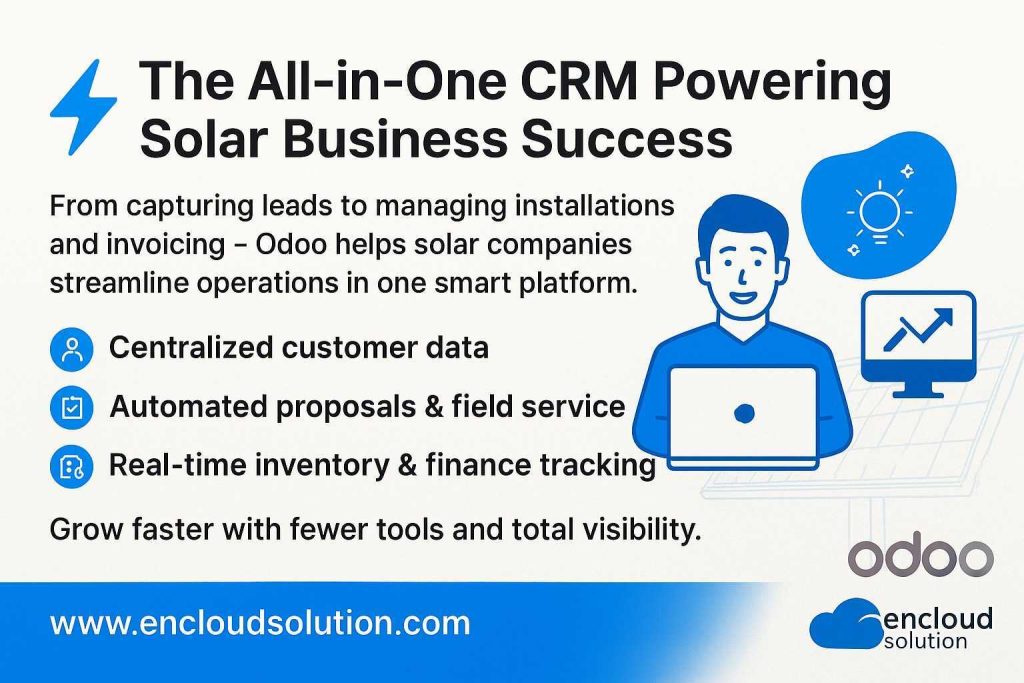
Not every company will pick the same tool. A solo installer might start with a lightweight solo solar CRM, while an enterprise may need a heavy-duty ERP. Key considerations include mobile support for field staff, integration with solar design or accounting software, and total cost of ownership. Make sure the CRM handles maintenance schedules and follow-ups as well. Also look for multi-currency and multi-language support if you operate in the US or Europe. It helps to have an implementation partner too. For instance, enCloudSolutions has deep experience customizing Odoo for solar workflows, ensuring the solution fits your needs. Odoo’s popularity means there is ample expertise available; certified partners can customize the system and train your staff, smoothing the transition. Odoo is designed to scale: a small installer can start with a few users and add modules as they grow to serve larger markets. This flexibility makes Odoo one of the best solar CRM software choices available.
Also Read: Odoo ERP Software
Conclusion
In the booming solar industry, effective CRM is no longer optional. Companies that adopt a CRM solar solution can manage leads, proposals, installations, and after-sales service all in one place. While specialized tools like SPOTIO excel at field canvassing, Odoo offers an all in one solar CRM business management platform. By combining CRM, project tracking, inventory and finance into one package, Odoo helps solar teams “operate projects, optimize inventory, [and] serve clients effectively”.
In practice, using Odoo can turn chaotic spreadsheets into smooth workflows. As one user put it, the platform made it “easier for our people to do things in a standard way and in a smarter way”. For U.S. and European solar businesses ready to scale, Odoo is a top contender especially with knowledgeable partners to guide implementation. By choosing the right CRM (like Odoo), you can focus on growing your solar business instead of juggling siloed systems.
Sources: We reviewed industry analyses and vendor materials (Sunbase Data, Nutshell, Spotio, Odoo, Ksolves) to compile these insights on solar CRM needs and Odoo’s advantages.
FAQs
Can I use Solo with my current CRM like Salesforce, Solar Cloud, or Solar CRM?
Yes, Solo can work alongside popular CRMs like Salesforce, Solar Cloud, or Solar CRM. Many solar businesses use Solo to handle proposals and design while keeping their CRM for customer tracking. This integration makes your workflow smoother because you can keep client data in your CRM and let Solo handle the project-specific tasks.
What support channels are standard for solar business platforms?
Most solar business platforms provide multiple support options such as email, live chat, phone support, and knowledge bases with tutorials. Some even offer dedicated account managers or training sessions. Having these channels helps solar companies quickly resolve issues, get product updates, and train their teams without losing time on projects or customer interactions.
Does Solo offer analytics or reporting tools for solar businesses?
Yes, Solo offers reporting and analytics tools that help solar companies track performance, sales, and project progress. These insights allow teams to see how proposals are converting, where bottlenecks are happening, and how to improve operations. Having data in one place makes it easier for solar contractors to make informed decisions and grow.
How do I switch my back-office operations from Sunbase to Solo?
Switching from Sunbase to Solo involves migrating your customer data, project details, and workflows. Usually, Solo’s support team helps guide this process with onboarding assistance. You’ll export data from Sunbase, set up your team on Solo, and adjust settings to match your processes. With training and support, the transition can be smooth and quick.
How do leading back-office platforms for solar integrate with other business apps?
Top back-office platforms for solar integrate with tools like CRMs, payment processors, project management apps, and accounting systems. This integration makes sure customer info, sales data, and financial records stay connected. Instead of switching between different systems, solar teams can access everything in one place, saving time and reducing the chances of mistakes.
What are the most effective back-office solutions for solar contractors?
The best back-office solutions for solar contractors are platforms that combine proposal design, project management, customer tracking, and reporting. Tools like Solo, Sunbase, or JobNimbus are popular because they simplify day-to-day operations. An effective solution helps contractors spend less time on paperwork and more time delivering projects, which means faster growth and happier customers.
What benefits do solar companies get from a single platform for sales and operations?
Using a single platform brings all data and workflows together. Solar companies can create proposals, track leads, manage projects, and process payments in one place. This reduces errors, saves time, and keeps teams on the same page. With everything connected, sales and operations work faster, which helps companies close more deals and complete projects smoothly.
How do solar CRM platforms help manage leads and projects for installers?
Solar CRM platforms help installers capture leads, track their progress, and convert them into projects. Once a lead turns into a project, the CRM manages schedules, tasks, and customer communication. This keeps everything organized from first contact to installation. By reducing manual tracking, CRMs make sure installers don’t lose leads or miss important steps.
What should enterprises look for in an energy CRM platform?
Enterprises should look for an energy CRM that supports lead management, project tracking, integrations with other apps, reporting, and customer communication. The platform should also be easy to use, mobile-friendly, and scalable as the business grows. A good energy CRM doesn’t just store data, it streamlines workflows and helps teams close deals faster while staying organized.
